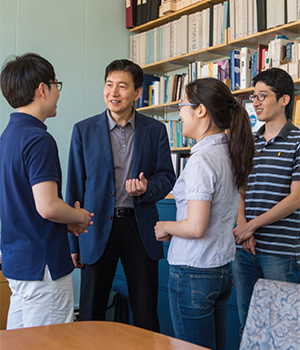
Harry Lee
(he/him)
Electrical Engineering and Computer Science
Providing a circuit of support
Professor Hae-Seung “Harry” Lee’s students are grateful for his dedication to the academic triad of research, teaching, and service, in particular his dedication to mentorship. “He takes care of students from his heart,” said his nominator. Lee’s careful attention to student work and projects makes itself felt at every meeting, and in each detailed review of a draft thesis – which he is often able to turn around in just a few days. His nominator volunteered that there were no fewer than four such drafts in the three weeks leading up to his final thesis deadline.
Prof. Lee’s generous spirit goes further, however. When the nominating student’s advisor left MIT, he volunteered to take over as advisor, dedicating financial support, software and equipment, even though the student’s research was not in his primary area. The nominator cited not only Prof. Lee’s valuable advice, but also the excitement he displayed when seeing the progress that resulted from the student’s time and effort. In addition, Prof. Lee remains invested beyond the classroom and the lab. Even after graduation, he checks in from time to time on job searches and makes connections whenever possible. Prof. Lee’s nominator owes an upcoming postdoc position to these introductions.
Born and raised in Seoul, South Korea, Lee joined the MIT faculty in 1984, after completing his Ph.D. at the University of California, Berkeley, where he worked on self-calibration techniques for A/D converters. He is the Director of the Center for Integrated Circuits and Systems (CICS) at MIT, and internationally known for his research in the areas of analog integrated circuits, early vision circuits, fabrication technologies, and solid-state sensors. Innovations include the development (with Prof. Charles Sodini’s group) of comparator-based switched capacitor (CBSC) analog circuits, which eliminate operational amplifiers while maintaining virtually all benefits of operational amplifier-based circuits, an approach that leads to greater power efficiency than conventional analog approaches. Prof. Lee’s love of circuits extends to his teaching in Course 6, where his classes are all highly reviewed.
Because of his many contributions to fostering scholarship and mentoring students, Prof. Lee helps weave our academic community together.
